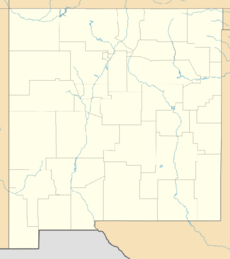Earth:Barber Peak
| Barber Peak | |
|---|---|
| Tsé Naajin | |
 West aspect | |
| Highest point | |
| Elevation | 5,778 ft (1,761 m) [1] |
| Prominence | 308 ft (94 m) [1] |
| Parent peak | Table Mesa (5,850 ft)[2] |
| Isolation | 1.47 mi (2.37 km) [1] |
| Coordinates | [ ⚑ ] : 36°35′14″N 108°41′47″W / 36.58722°N 108.69639°W [3] |
| Geography | |
| Location | San Juan County, New Mexico, US |
| Parent range | Chuska Mountains[2] Colorado Plateau |
| Topo map | USGS Table Mesa |
| Geology | |
| Age of rock | Oligocene |
| Mountain type | Volcanic plug |
| Type of rock | Volcanic breccia |
| Climbing | |
| First ascent | 1981 by M. Dalen, D. Nordstrom[4] |
| Easiest route | Southeast gully, class 5.8+ |
Barber Peak is a 5,778-foot (1,761-meter) elevation volcanic plug located on Navajo Nation land in San Juan County of northwest New Mexico, United States.[3] It is a prominent landmark set one-half mile east of U.S. Route 491, approximately 15 miles south of the community of Shiprock, New Mexico. Its nearest higher neighbor is Table Mesa, one mile to the west, and Cathedral Cliff is set 1.5 mile to the northwest. Barber Peak is one of the phreatomagmatic diatremes of the Four Corners area, and with significant relief as it rises 300 feet (91 meters) above the high-desert plain. It is situated about 11 miles (18 km) southeast of Shiprock, the most famous of these diatremes. Barber Peak is set in the northeastern part of the Navajo Volcanic Field, a volcanic field that includes intrusions and flows of minette and other unusual igneous rocks which formed around 30 million years ago during the Oligocene.[5] In the Navajo language, this geographical feature is called Tsé Naajin, meaning "black downward rock."[6]
Climate
According to the Köppen climate classification system, Barber Peak is located in a semi-arid climate zone with cold winters and hot summers.[7] Precipitation runoff from this feature drains into the San Juan River drainage basin.
See also
- Rock formations in the United States
References
- ↑ 1.0 1.1 1.2 "Barber Peak - 5,778' NM". https://listsofjohn.com/peak/15509. Retrieved 2020-12-04.
- ↑ 2.0 2.1 "Barber Peak". https://peakvisor.com/peak/barber-peak.html. Retrieved 2020-12-04.
- ↑ 3.0 3.1 "Barber Peak". United States Geological Survey. https://geonames.usgs.gov/apex/f?p=gnispq:3:::NO::P3_FID:886056.
- ↑ Barber Peak, Mountainproject.com
- ↑ Steven C. Semken, The Navajo Volcanic Field, in Volcanology in New Mexico, New Mexico Museum of Natural History and Science Bulletin 18, p. 79, 2001. ISSN 1524-4156
- ↑ Laurance D. Linford, Tony Hillerman's Navajoland, 2nd edition, University of Utah Press, 2005, page 10.
- ↑ Peel, M. C.; Finlayson, B. L.; McMahon, T. A. (2007). "Updated world map of the Köppen−Geiger climate classification". Hydrol. Earth Syst. Sci. 11. ISSN 1027-5606.
External links
- Weather forecast: National Weather Service
- Barber Peak rock climbing: Mountainproject.com
 |



